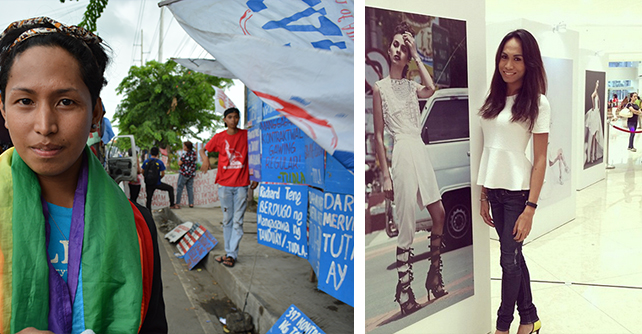By Ivanka Custodio

Two transwomen in different situations and classes, but are both suffering from the injustice of a system that denies their transgender existence and employs various means of regulating them: by hands held up at entrances, with dress codes, school policies on appropriate behavior, by the lack of safety in comfort rooms and in many instances, and physical and sexual violence. Their right to education and work is treated as secondary to the appropriateness of their dress.
Veejay Floresca was looking to spend an evening with her friends, one of whom was celebrating his birthday that night. Their venue: Valkyrie Club, a luxury bar that, while it can be deemed as “high-end” is being debated by some depending on which social ladder rung they are in, can be generally considered expensive with its door charge of P500.
Walking up to the entrance, Veejay was stopped by the security bouncer of the club by holding up his hand and asking her to present her ID. After handing over her California State-issued ID which declares her gender as “female”, the guard refused to accept the information stated in the document and himself decided that Veejay was a man (based on what aspect of Veejay’s made him arrive at that conclusion, it is hard to tell) and could therefore not enter Valkyrie’s premises because of the bar’s no cross-dressing policy.
Veejay is a designer of international repute, with her creations priced at P90,000 at the minimum. Veejay is also a transgender woman which means that though she was assigned the sex “male” when she was born, identifies and lives as a woman. On the other hand, a cross-dressing man, as what the club’s policy categorizes her, identifies as a man and decks himself in feminine clothes.
In Cabuyao, Laguna, another transwoman named Claire was also trying to get inside the premises of a property. It was not an overpriced bar, though it has alcoholic beverages inside, and in place of a bouncer’s hand held up is the pressure of the water cannon beating down her body, and a rally of sticks and stones hitting her arms, legs, stomach.
Claire was trying to get inside the premises of Asia Brewery, a company she has been working in as a contractual worker for more than four years where for every P1 profit the company makes, she gets P0.003 in salary. There are a total of 397 contractual workers in Asia Brewery. Despite its high revenues, the management refuses to regularize employees like Claire, an unjust but nonetheless widespread practice among capitalists in the Philippines.
Back to the scene outside the gate of Asia Brewery. Drenched, bloody, and sore all over her body, she pushes forward along with her co-workers, because getting in also means a chance to get her grievances heard, a chance to get her job back. A job for which she had to make the painful decision to cut her hair short and don masculine clothes for because the company would not hire transgender women.
Two transwomen in different situations and classes, but are both suffering from the injustice of a system that denies their transgender existence and employs various means of regulating them: by hands held up at entrances, with dress codes, school policies on appropriate behavior, by the lack of safety in comfort rooms and in many instances, and physical and sexual violence. Their right to education and work is treated as secondary to the appropriateness of their dress.
As people whose gender identities—their sense of being a man, woman or neither—are not the same as their sex assigned at birth, they are repeatedly told that their bodies should subscribe to the imperative of sex-gender identity congruence. But more than the gendered policing that is systemic in the Philippines, many transgender workers like Claire are also restricted in their mobility in assembly lines and their linking arms with co-workers to form labor unions. Claire works her ass off in order to survive, while still dreaming of having enough means to fully transition and actualize their gender identity. But for now, Claire would just like to get back in her workplace.
There was news that Vice Ganda, who has a small share in the bar, called for a meeting with Veejay, along with other transgender activists who launched the viral #TransRevolutionPH social media campaign. The management of Valkyrie has reportedly also issued an apology to Veejay. An advanced congratulations to Veejay, it seems that the doors of Valkyrie might soon rightfully swing open for her to enter in her transgender self. Whether or not to patronize a bar that has discriminated against not just her but also a number of her trans sisters would be her decision to make. And as for Claire, when would she finally get her chance to get in?
P.S.: June is Pride Month, a commemoration of the 1969 Stonewall Riots where poor and marginalized transgenders, gays and lesbians linked arms to fight against structural oppressions. I have organized and attended a number of Pride Marches in the Philippines, and in these events I found myself so touched and amazed at the sight of fellow LGBTs fighting to break free from the chains of gender oppression. When I joined the picket in Tanduay where I met Claire and other Tanduay workers who are transwomen and gay men, it gave me an immovable resolve to fight for and with them in order to shatter the two-fold chain of gender and class oppression.




























































